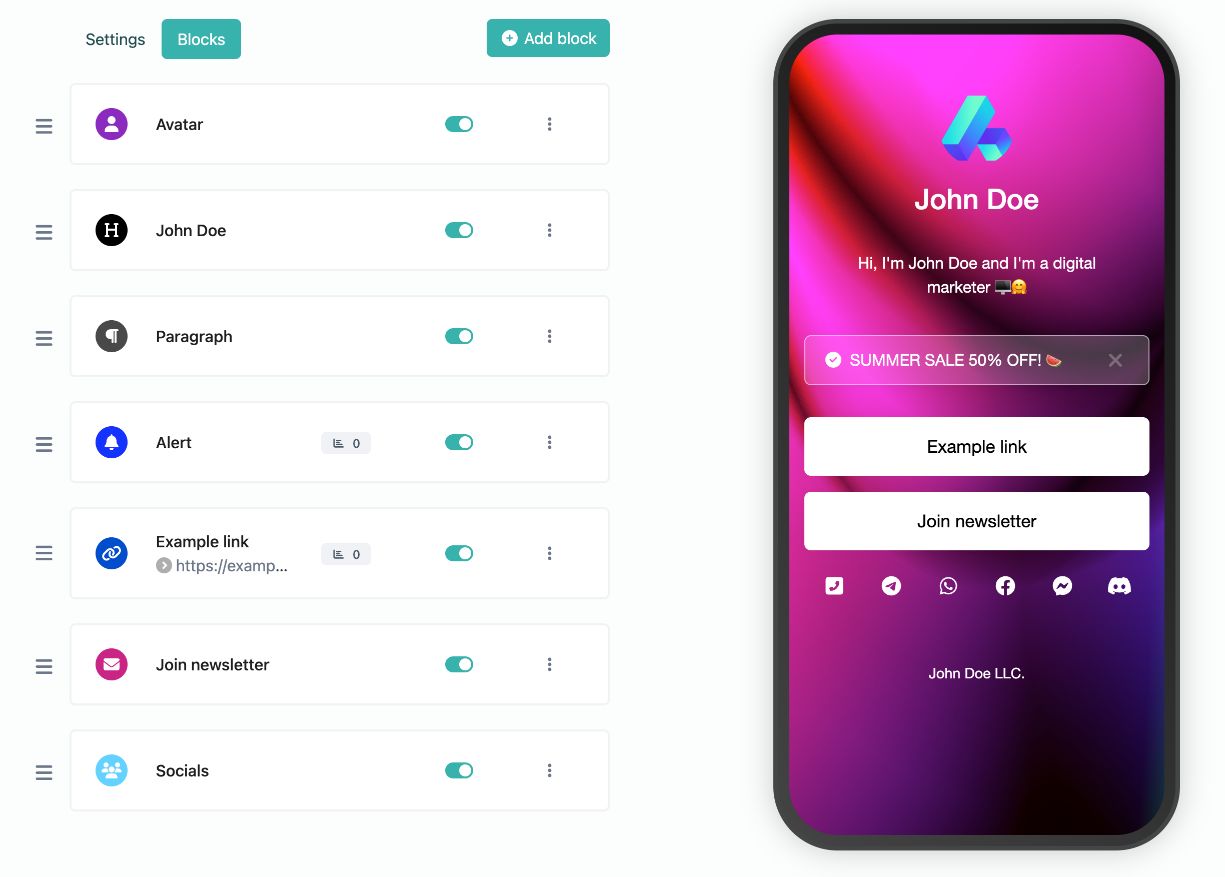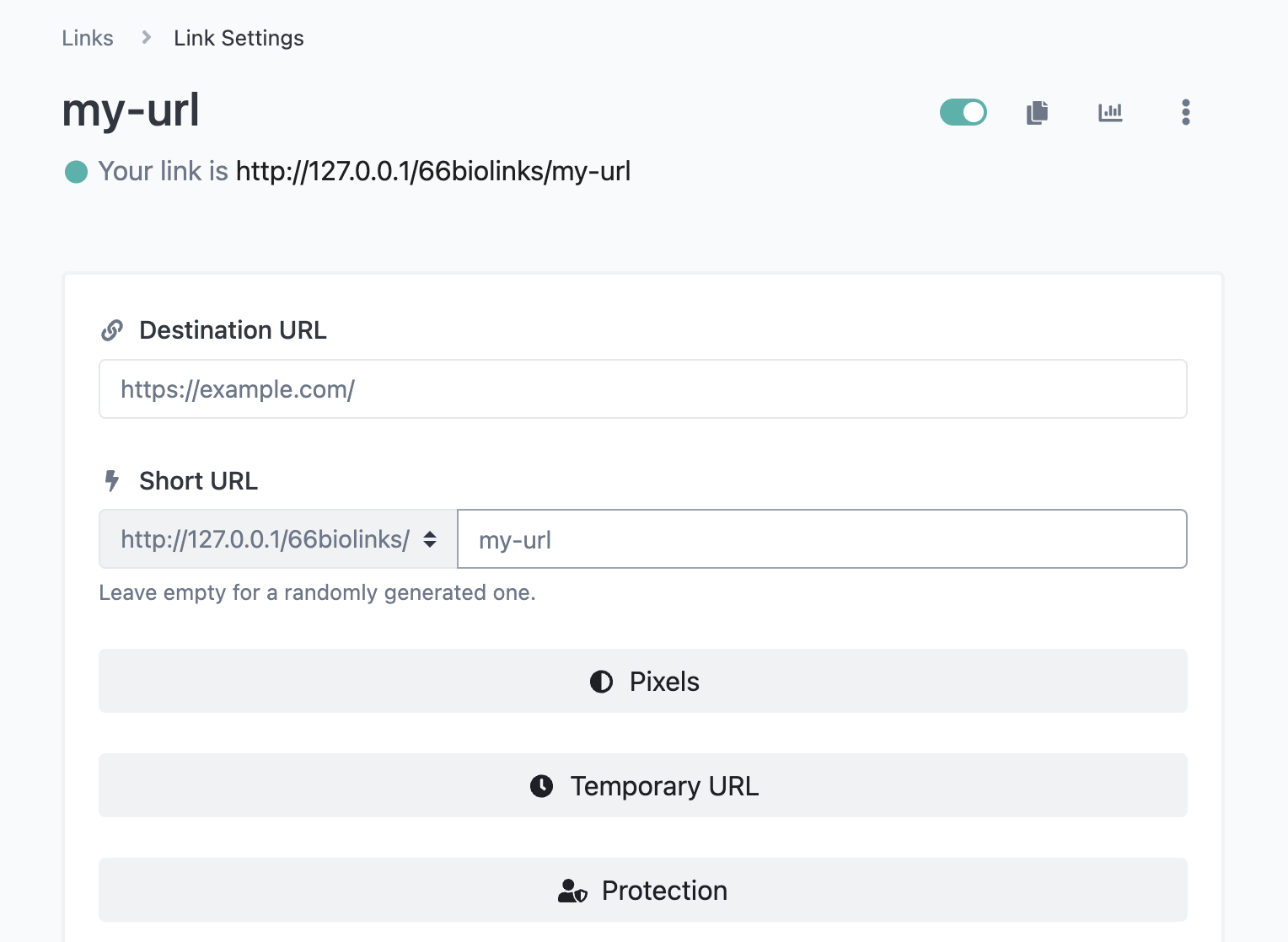Do everything with one platform.
🔗 Short links 📱 Bio pages 🤳 QR codes 👤 Share Vcards 📃 Transfer files 🧑💻 Host HTML Sites


Bio link pages
Create your own unique & highly customizable bio link page with ease.
-
Custom colors & branding
-
Tons of ready-to-use components
-
SEO settings
-
Password protection, sensitive content warning

Shortened links
Yes! You can use our service as a shortener as well.
-
Scheduling & expiration limits
-
Country, device & language targeting
-
A/B Rotation
-
Password protection, sensitive content warning

Host static sites
Upload your website files and we will host them for you.
-
HTML, CSS, JS, Video / Audio files.
-
Analytics, password protected
-
Automated tracking pixels
-
and much more...

QR Codes
Fully featured QR code generator system with easy to use templates.
-
Custom colors with gradients
-
Custom logo & background branding
-
Multiple QR shapes to choose from
-
Customizable QR Code Frames
-
Vcard, WiFi, Calendar, Location..etc templates

Built-in analytics
Easy to understand, yet detailed and comprehensive analytics for all your links. GDPR, CCPA and PECR compliant.
-
Countries & cities
-
Referrers & UTMs
-
Devices & operating systems
-
Browsers, Languages
URLs that open apps automatically
Short links that automatically detect the used app and open it on mobile.
Tracking pixels
All the links easily integrate with any of the following pixel providers.
126 useful tools
Web utility tools. Fast, reliable and easy to use.
A collection of great checker-type tools to help you check & verify different types of things.
A collection of text content related tools to help you create, modify & improve text type of content.
A collection of tools that help you easily convert data.
A collection of the most useful generator tools that you can generate data with.
A collection of highly useful tools mainly for developers and not only.
A collection of tools that help modify & convert image files.
A collection of date & time conversion related tools.
A collection of other random, but great & useful tools.
Here's what people are saying

“ Lorem ipsum dolor sit amet, consectetur adipiscing elit.Ornare ex. Vivamus eu ex non orci condimentum placerat ac ac nisi. Nam velit libero, hendrerit vitae auctor eget, congue ut ante. ”

“ Lorem ipsum dolor sit amet, consectetur adipiscing elit. Praesent finibus vestibulum porta. Sed id eros quam. Nunc at nisi vel arcu placerat gravida. ”

“ Praesent finibus vestibulum porta. Sed id eros quam. Proin lacinia ipsum porttitor, sollicitudin est in, ornare ex. Vivamus eu ex non orci condimentum placerat ac ac nisi. Nam velit libero, hendrerit vitae auctor eget, congue ut ante. ”
Simple, transparent pricing.
Choose the plan that is right for you and your budget.
-
15 biolink pages
-
0 biolink blocks
-
20 enabled biolink blocks
-
25 shortened links
-
0 file links
-
0 vcard links
-
0 event links
-
0 static sites
-
0 QR codes
-
0 bulk QR codes Limit
-
10 projects
-
0 splash Pages
-
10 pixels
-
1 custom domains
-
0 days statistics retention
-
No forced splash page
-
Custom back-half
-
Deep linking
-
Removable branding
-
Custom branding
-
Dofollow links
-
Leap link
-
SEO features
-
Additional fonts
-
Custom CSS
-
Custom JS
-
Indepth statistics
-
Links scheduling & limiter
-
Cloaking short URLs
-
Auto open app on mobile
-
UTM parameters
-
Password protection
-
Sensitive content
-
No ads
-
API access
Answers for your common questions
Get started
Start using the swiss army knife for the marketers.


